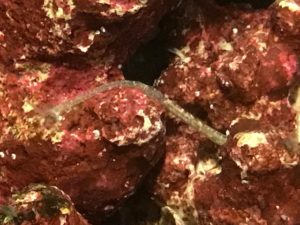
Medusa Worms in Saltwater Aquariums
Is the Medusa Worm a friend or foe to your fish and corals? You may have seen them for purchase but they may also enter your saltwater aquarium has hitchhikers. Here is what you can expect if you find a medusa worm living in your aquarium:
Is a Medusa Worm Actually a Worm?
Medusa worms are often mistaken for sea worms but are actually legless sea cucumbers. They are members of the family Synaptidae in the class Holothuroidea and the Phylum Echinodermata. Medusa worms have long worm-like bodies covered in sticky cells that help them adhere to any surface. They are typically small creatures, but over time they can grow very big and long, some can get up to 6 feet in the wild. They are also able to expand or retract their bodies to fit into tight spaces.
 The Good, Bad, and Ugly of Medusa Worms
The Good, Bad, and Ugly of Medusa Worms
The marine invertebrate has been known to help keep the tank clean as they feed on tiny particulate matter on the bottom of the aquarium. While they may reduce cleaning efforts, there are also some things you should consider. Medusa Worms are vulnerable to hermit crabs who prey on them and have the ability to eat through their soft tissue. If they feel threatened by predators, are stressed, or injured, they secrete a toxin that can be extremely harmful to other tank mates. Some fish will even pick on the tentacles of this worm, causing them to release their poison.
Conclusion: Should You Buy a Medusa Worm?
For these reasons, Medusa Worms are more of an enemy to your tank than they are a friend. While they may look unique, they can be a nuisance and given the right circumstances, could harm the other tank inhabitants. Once the sea cucumbers release their toxin, it is game over for the rest of your fish and can be very difficult to try and save them. As soon as that poison touches the gills of its tank mates, the fish essentially drown.
While it is not recommended to have these worms in your saltwater aquarium, there are a few things to be aware of if you do decide to add them to your tank. Make sure you do your research on this animal – try to properly identify the type of species, as it will help you to understand its care and feeding habits. Also, provide a comfortable home for the sea cucumber so they have sufficient area to move around and hide if necessary. As a precaution, you may also consider placing a shield on intakes and overflow apertures. Whether a friend or foe to your tank, we can all agree that its uniqueness is genuinely one of a kind.



















